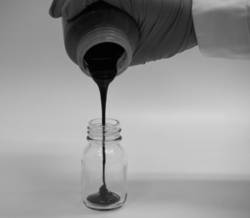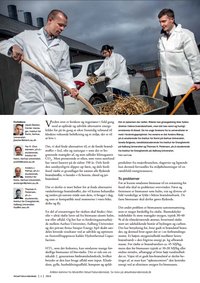
All over the world, researchers try to develop alternatives to fossil fuels. Oil is one of the most important fossil fuels since almost all liquid fuels – petrol and diesel etc. – are based on oil. A good alternative could be to transform for example hay or wood into oil since it itself can’t be used as fuel. One of the challenges is that it typically contains a large amount of oxygen which decreases the heating value. For oil the heating value is 45 MJ/kg whereas it is only 10-20 MJ/kg for bio masses.
One of the methods that can be used to produce liquid bio oil from for example household rubbish, compost or slurry is the process Hydrothermal Liquefaction, HTL. The methods works by boiling the mass under pressure at 250-350 atm. at temperatures around 350 ˚C. Under those conditions the oxygen is released and 80-90 % of the biomass ends up in an oil phase having a heating value of around 35 MJ/kg.

Do you want to read more about bio oil? The paper Fra affald til gylle: Kør på gylle, flyv på græs was published in Aktuel Naturvidenskab in 2013. Read it here.